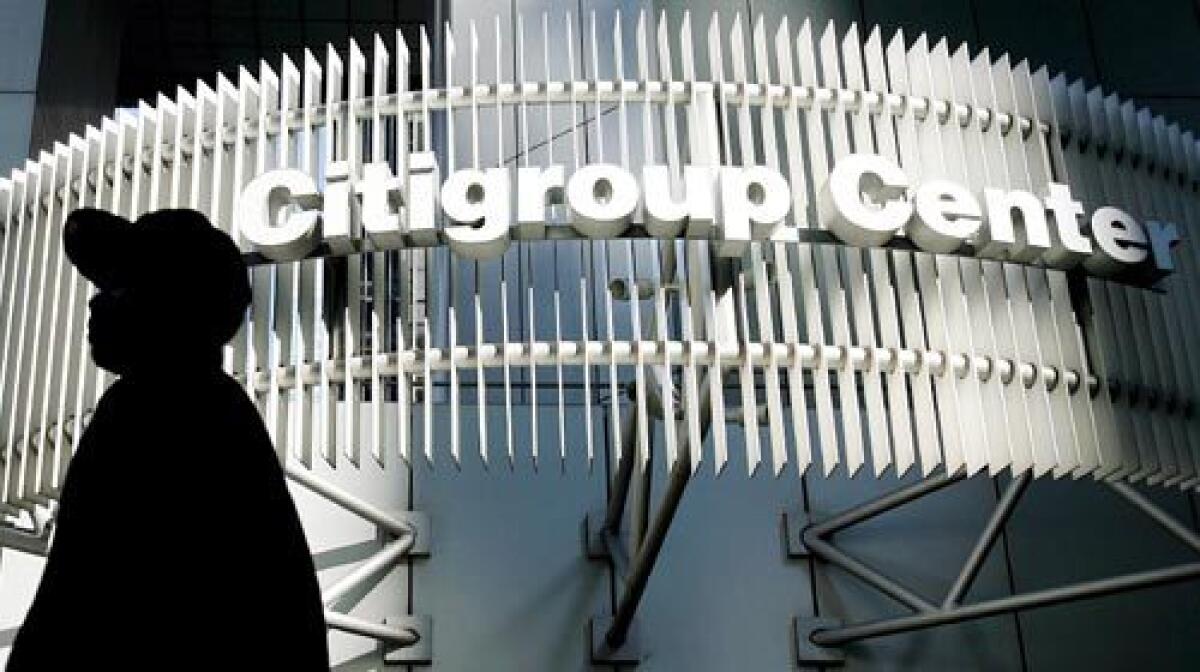Citigroup loses nearly $10 billion

- Share via
NEW YORK — The sub-prime mortgage crisis hit Wall Street with full fury Tuesday as Citigroup Inc. reported a nearly $10-billion fourth-quarter loss, and both Citigroup and Merrill Lynch & Co. got cash infusions to shore up their financial stability.
Citigroup wrote down by $18.1 billion the value of sub-prime-related holdings on its books, slashed its dividend 41% and said it would eliminate 4,200 of its roughly 300,000 jobs worldwide in what is expected to be the opening volley in a series of layoffs by the company this year.
The banking giant also reported a sizable jump in credit problems with its consumer loans in the U.S. and indicated that those troubles extended beyond mortgages to include credit cards and auto loans -- raising more concerns about the health of American consumers.
The news drove financial stocks sharply lower and helped pull the broad market down to its lowest level since the credit market debacle began last summer.
Citigroup’s huge loss and twin equity injections underscore how deeply the sub-prime maelstrom has shaken the pillars of Wall Street.
In recent weeks, major investment banks have been forced to raise more than $50 billion -- most of it from cash-rich foreign governments and related entities -- to fortify themselves after record-setting mortgage-related losses.
The results left open the question about whether those losses, which have snowballed far beyond initial projections, will continue to mount.
“It’s astounding that it’s come to this,” said Bruce S. Foerster, president of South Beach Capital Markets, a financial advisory firm in Miami.
Citigroup’s net loss of $9.83 billion, or $1.99 a share, was the largest loss in the bank’s 196-year history. A year earlier, the company earned $5.1 billion, or $1.03 a share.
The $18.1-billion sub-prime hit topped an $8-billion to $11-billion estimate Citigroup made in November and was in addition to a $5.9-billion third-quarter write-down that led to the resignation of Chief Executive Charles Prince.
“Our financial results this quarter are clearly unacceptable,” said Vikram Pandit, who took over as CEO.
Citigroup said it whittled its sub-prime assets to $37.3 billion at year-end from $54.6 billion on Sept. 30.
That still “sizable exposure,” however, will lead to more write-downs if the sub-prime securities market keeps weakening, wrote William Tanona, an analyst at Goldman, Sachs & Co., in a note to clients.
Others argued the worst was over.
“We believe these actions will get the bulk of credit-related write-downs, and all likely capital-raising, into the past,” David Hilder, an analyst at Bear Stearns Cos., wrote in a research note.
Citigroup wrote off a net $1.6 billion of loans as uncollectible and added $3.9 billion to its reserve to cover anticipated loan losses in coming months. It cited increased delinquencies on personal loans, credit cards and auto loans as well as mortgages, including home equity loans.
To conserve cash, Citigroup hacked its quarterly dividend to 32 cents a share from 54 cents. Its share price slumped $2.12, or 7.3%, to $26.94, a five-year low.
Citigroup raised $12.5 billion by selling preferred stock to private investors, and said it would sell $2 billion more in a public offering. The infusions are in addition to $7.5 billion raised in November from an investment fund of the Abu Dhabi government.
Of the $12.5 billion, almost $6.9 billion came from an investment fund run by the government of Singapore. Among other investors were the Kuwait Investment Authority, former Citigroup Chairman Sanford Weill, Saudi Prince Alwaleed bin Talal -- who already was a major shareholder -- and Los Angeles-based money management giant Capital Group Cos.
Capital Group, which manages the American Funds mutual fund group, was the largest single institutional holder of Citigroup common stock as of Sept. 30, with a 4.6% stake. The new preferred stock will go into Capital Group’s mutual funds, but the company declined to say which ones.
For its part, Merrill got $6.6 billion from Korean Investment Corp., Kuwait Investment Authority and Mizuho Corporate Bank.
But Merrill’s shares slid $2.96, or 5.3%, to $53.01.
Banks and brokerages are required to maintain certain levels of capital -- their assets minus liabilities -- as a cushion to protect themselves from big financial losses. Though neither Citigroup nor Merrill was in danger of falling below those levels, the firms raised funds in part to reassure investors and customers that their financial footing was sound.
Hamilton reported from New York. Petruno reported from Los Angeles.
More to Read
Sign up for Essential California
The most important California stories and recommendations in your inbox every morning.
You may occasionally receive promotional content from the Los Angeles Times.













